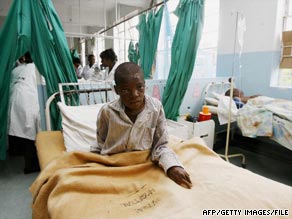U.N. official: Zimbabwe's woes 'pose signficant challenge'
- Story Highlights
- U.N.: More than 5 million Zimbabweans face starvation
- More than half of the population has limited or no access to safe water, U.N. has said
- U.N. appeal for Zimbabwe assistance only 44 percent toward goal
- Government's insistence that nation is "in recovery" draws laughter from journalists
HARARE, Zimbabwe (CNN) -- The "humanitarian situation remains serious" in Zimbabwe amid cholera, starvation and a continuing economic crisis, a United Nations official said Wednesday at a World Humanitarian Day ceremony in Harare.

The cholera epidemic in Zimbabwe resulted in nearly 100,000 cases, 4,288 of them fatal, the U.N. said.
"Although Zimbabwe is not facing armed conflict, humanitarian threats such as food shortages and outbreak of diseases such as cholera pose a significant challenge," said Agostinho Zacarias, U.N. Development Programme representative in the country. "The recent [cholera] epidemic resulted in 98,592 cumulative cases, including 4,288 deaths between August 2008 and July 2009."
Cholera thrives in areas without clean water and proper sanitation, and the United Nations has said 6 million people in Zimbabwe -- more than half the population -- have limited or no access to safe water and sanitation in rural and urban areas. It also estimates more than 5 million in the nation face starvation.
Although the cholera epidemic was declared under control last month, a renewed outbreak is likely, international health officials have said.
Zimbabwe's humanitarian situation was worsened by its economic collapse last year. The nation's coalition government, formed six months ago by former political enemies President Robert Mugabe and Prime Minister Morgan Tsvangirai, is seeking more than $8 billion to aid its recovery.
A U.N. appeal launched earlier this year has so far raised only 44 percent of its goal of $718 million for humanitarian assistance.
Don't Miss
But Rueben Marumahoko, a Zimbabwe junior minister and an appointee of Mugabe, said the country is no longer in crisis.
"There is need for Zimbabwe to move from the humanitarian support stage to the recovery stage," he said. "Zimbabwe is no longer a country in crisis but a country in recovery." The comment drew laughter from many journalists covering the event.
Among the nation's problems is a strike by doctors that is almost a month old. The doctors are demanding housing and car allowances and a monthly salary of $1,000 [U.S.] -- a sharp rise from the current $170 a month paid to all public servants.
Nurses joined the strike this week, saying that doctors have a genuine case that needs urgent attention.
The action is threatening the country's ability to deal with H1N1 influenza, also known as swine flu, and to prepare for the possible resurgence of the cholera epidemic.
All About United Nations • Cholera • Zimbabwe

 Sit tight, we're getting to the good stuff
Sit tight, we're getting to the good stuff
